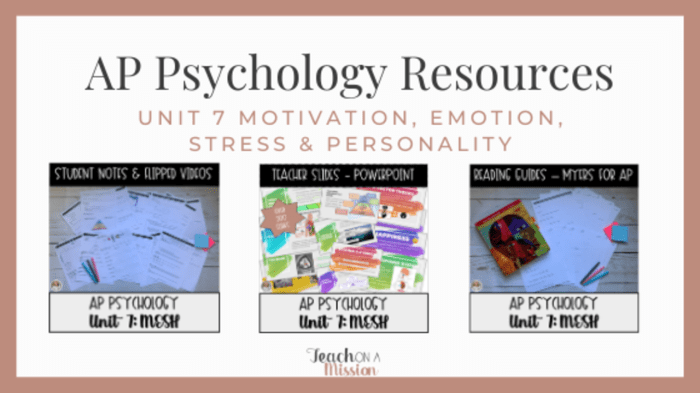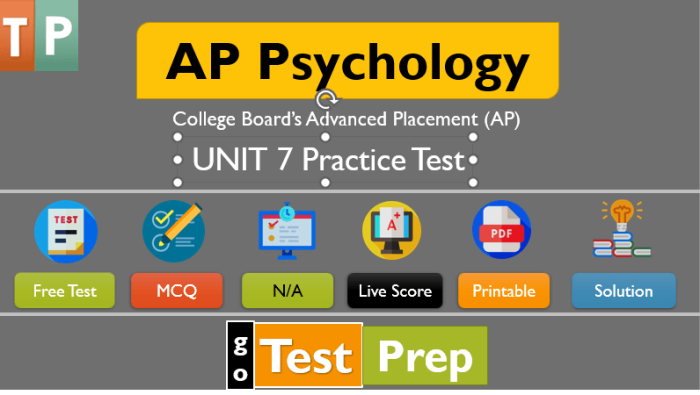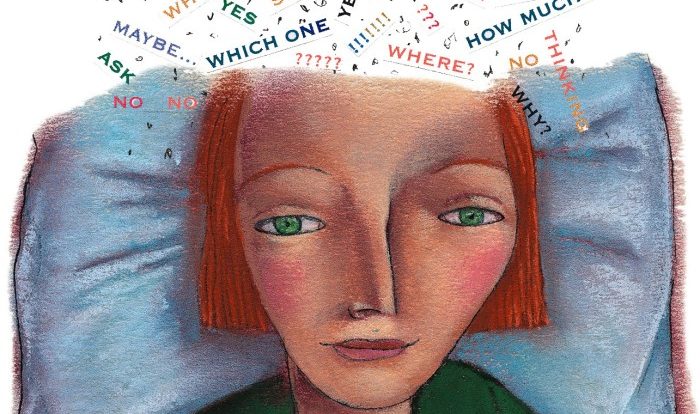Ap psychology unit 7 motivation emotion and personality – Delving into the realm of AP Psychology Unit 7, we embark on an exploration of the intricate relationship between motivation, emotion, and personality. These fundamental elements shape our behaviors, decision-making, and interactions with the world around us.
This unit unravels the major theories of motivation, from intrinsic desires to external rewards and punishments. We delve into the complexities of emotion, identifying its components and exploring how it influences our thoughts and actions. Furthermore, we examine the multifaceted nature of personality, uncovering its developmental roots and the impact it has on our social interactions.
Motivation

Motivation refers to the internal processes that drive individuals to behave in certain ways. Major theories of motivation include:
- Maslow’s Hierarchy of Needs:Proposes that individuals are motivated by a hierarchy of needs, from basic physiological needs to self-actualization.
- McClelland’s Theory of Needs:Identifies three primary needs that motivate behavior: achievement, power, and affiliation.
- Expectancy Theory:Suggests that individuals are motivated by their expectations about the outcomes of their actions.
Intrinsic motivation arises from within an individual and is driven by enjoyment or interest in the task itself, while extrinsic motivation comes from external rewards or punishments.
Role of Rewards and Punishments, Ap psychology unit 7 motivation emotion and personality
Rewards and punishments play a significant role in motivation by reinforcing desired behaviors and discouraging unwanted ones. Positive reinforcement involves rewarding desired behaviors, while negative reinforcement involves removing or avoiding unpleasant consequences. Punishment, on the other hand, involves imposing negative consequences to discourage undesirable behaviors.
Emotion: Ap Psychology Unit 7 Motivation Emotion And Personality

Emotion refers to a complex psychological state that involves subjective feelings, physiological responses, and cognitive processes. Components of emotion include:
- Subjective Feelings:The conscious experience of emotion, such as joy, sadness, or anger.
- Physiological Responses:Physical reactions to emotion, such as increased heart rate or muscle tension.
- Cognitive Processes:Thoughts and beliefs that accompany emotions.
Different types of emotions include:
- Basic Emotions:Universal emotions experienced by all humans, such as happiness, sadness, anger, and fear.
- Social Emotions:Emotions that arise in social situations, such as embarrassment, guilt, or pride.
- Complex Emotions:Emotions that involve a combination of basic emotions, such as love or jealousy.
Emotions influence behavior and decision-making by providing information about the environment, motivating actions, and shaping cognitive processes.
Personality
Personality refers to the unique combination of traits and characteristics that distinguish one individual from another. Theories of personality development include:
- Psychodynamic Theory:Emphasizes the role of unconscious conflicts and early childhood experiences in shaping personality.
- Behavioral Theory:Focuses on the role of learning and conditioning in personality development.
- Humanistic Theory:Views personality as a result of self-actualization and the pursuit of personal growth.
Different personality traits include:
- Extraversion:A tendency to be outgoing, sociable, and assertive.
- Introversion:A tendency to be reserved, quiet, and self-reflective.
- Neuroticism:A tendency to experience negative emotions and be prone to anxiety and depression.
- Agreeableness:A tendency to be cooperative, trusting, and empathetic.
- Conscientiousness:A tendency to be organized, responsible, and self-disciplined.
Personality influences behavior and social interactions by shaping an individual’s thoughts, feelings, and actions.
The Relationship Between Motivation, Emotion, and Personality
Motivation, emotion, and personality are closely related and interact to influence behavior. Motivation provides the drive to engage in certain behaviors, while emotion provides the subjective experience and physiological responses that accompany those behaviors. Personality traits shape an individual’s emotional experiences and motivations.
For example, an extroverted individual may be more motivated to engage in social activities, while an introvert may be more motivated to pursue solitary activities. Similarly, an individual with a high need for achievement may be more motivated to succeed in competitive tasks, while an individual with a low need for achievement may be less motivated to compete.
Understanding the interplay between motivation, emotion, and personality is crucial for comprehending human behavior and promoting personal growth and well-being.
General Inquiries
What are the key theories of motivation?
Maslow’s hierarchy of needs, drive theory, and expectancy theory are among the major theories of motivation.
How do emotions influence decision-making?
Emotions can bias our perceptions, alter our risk-taking behavior, and shape our preferences.
What is the role of personality in social interactions?
Personality traits influence our communication styles, relationship dynamics, and social behavior.
